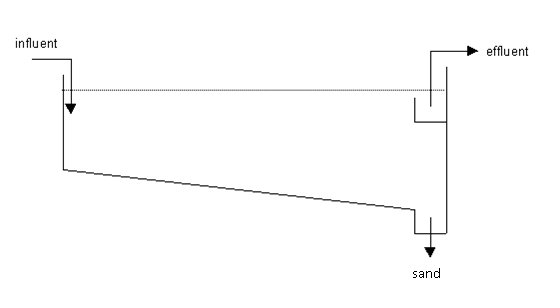Method diagram

Method and installation description
The aim of a sand collector is to remove heavy and fast sinking inorganic matter from wastewater to prevent these substances from damaging mechanical installations or causing difficulties during the purification of wastewater. A sand collector is implemented at the start of the purification process; before the preliminary sedimentation tank and before biological purification. The sand collector can be gutter-shaped or flat. Wastewater flows through it at a reasonable speed, whereby the sand sinks. Sand collectors and fat-separators are sometimes combined. In this case, aeration also improves the separation of sand particles from other lighter particles. Sand is continuously removed using scrapers or an airlift, or discontinuously by shovelling sand out of the sand collector.
Specific advantages and disadvantages
A sand collector is a simple and relatively cheap installation.
Application
A sand collector is a much implemented purification technique in sectors like mineral extraction (NACE 14) and processing of vegetables and potatoes (NACE 15.3). Sand collectors are also used as a pre-treatment in municipal wastewater purification stations.
Boundary conditions
A sand collector is not accompanied by any special conditions.
Effectiveness
A sand collector is dimensioned based on the size and nature of the particles one wants to separate. A high removal efficiency can be realised if dimensioning is done correctly.
Support aids
none
Environmental issues
Sand is released as by-product. A sand collector must only eliminate heavy matter and no suspended organic substances, otherwise the removed sand could cause odour problems. A sand flow could possibly be further diluted using a sand classifier.
Costs
Industrial or communal sand collectors are normally made from concrete. For concrete that is cast on site, one can assume a guide price of € 200-300. This price must be requested for each individual case, depending on the size, shape (slanted), quality of underground, etc.
Comments
None
Complexity
A sand collector is not a complex process.
Level of automation
A sand collector only requires a limited amount of automation.
References
- VITO-SCT, revision of technical notes WASS, 2009
Version February 2010

